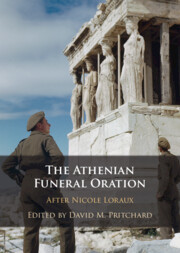Book contents
- The Athenian Funeral Oration
- The Athenian Funeral Oration
- Copyright page
- Contents
- Figures and Tables
- Contributors
- Foreword
- Preface
- Abbreviations
- 1 The Funeral Oration after Loraux
- Part I Contexts
- Part II The Historical Speeches
- Part III The Literary Examples
- Part IV Intertextuality
- 12 Imagining Athens in the Assembly
- 13 Fighting Talk: War’s Human Cost in Drama and Law-Court Speeches
- 14 Making Athens Great Again: Tragedy and the Funeral Oration
- 15 Euripides’ Erechtheus and the Athenian Catalogue of Exploits: How a Tragic Plot Shaped the Funeral Oration
- 16 ‘Back Then When the Barbarians Came’: Old Comedy and the Funeral Oration
- Part V The Language of Democracy
- References
- General Index
- Index of Sources
12 - Imagining Athens in the Assembly
from Part IV - Intertextuality
Published online by Cambridge University Press: 11 January 2024
- The Athenian Funeral Oration
- The Athenian Funeral Oration
- Copyright page
- Contents
- Figures and Tables
- Contributors
- Foreword
- Preface
- Abbreviations
- 1 The Funeral Oration after Loraux
- Part I Contexts
- Part II The Historical Speeches
- Part III The Literary Examples
- Part IV Intertextuality
- 12 Imagining Athens in the Assembly
- 13 Fighting Talk: War’s Human Cost in Drama and Law-Court Speeches
- 14 Making Athens Great Again: Tragedy and the Funeral Oration
- 15 Euripides’ Erechtheus and the Athenian Catalogue of Exploits: How a Tragic Plot Shaped the Funeral Oration
- 16 ‘Back Then When the Barbarians Came’: Old Comedy and the Funeral Oration
- Part V The Language of Democracy
- References
- General Index
- Index of Sources
Summary
Assembly-speeches and funeral speeches invite comparison. In both, prominent politicians addressed a large and predominantly non-elite audience, and war played a predominant role. Yet, contrasts between them abounded. The funeral oration emphasised the nobility of Athens and more particularly the selflessness and the patriotism of the war dead, whereas assembly-speeches criticised the decadence of Athenian politics and the short-sighted selfishness of Athenian citizens. The speaker of a funeral speech was self-effacing. The speaker in the assembly, by contrast, asserted his insight and knowledge, while he criticised his fellow citizens almost undemocratically. The funeral oration addressed a united Athens and avoided divisive issues, whereas disagreement was the raison d’être of assembly-speeches. In spite of all these differences, similarities lay just below the surface. Insofar as their advice for the future depended on the past, assembly speakers invoked the patriotic and slanted history that was conspicuously promulgated in the funeral oration. Funeral speeches insisted on Athenian exceptionalism in the Greek world. Assembly-speeches did the same, if only to contrast Athens’s current policies with its true role as the leader of the Greek world and the guardian of freedom and justice.
Keywords
- Type
- Chapter
- Information
- The Athenian Funeral OrationAfter Nicole Loraux, pp. 261 - 279Publisher: Cambridge University PressPrint publication year: 2024

